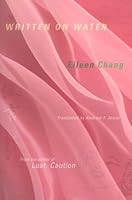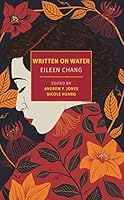- Welcome to FictionDB, Guest
- | My Account
- | Help

Written on Water — Eileen Chang
buy the book from amazon
Paperback editions:
Hardcover editions:
eBook editions:
Audio editions:
Large Print editions:
Browse Similar Books at Amazon
Literature & Fiction->Literary
Literature & Fiction->World Literature->Asian->Chinese
Description
Known as "the Garbo of Chinese letters" for her elegance and the aura of mystery that surrounded her, Eileen Chang is regarded as one of the greatest and most influential modern Chinese novelists and cultural critics of the twentieth century. In Written on Water, first published in 1945 and now available for the first time in English, Chang offers essays on art, literature, war, and urban life, as well as autobiographical reflections. Chang takes in the sights and sounds of wartime Shanghai and Hong Kong, with the tremors of national upheaval and the drone of warplanes in the background, and inventively fuses explorations of urban life, literary trends, domestic habits, and historic events.
These evocative and moving firsthand accounts examine the subtle and not-so-subtle effects of the Japanese bombing and occupation of Shanghai and Hong Kong. Eileen Chang writes of friends, colleagues, and teachers turned soldiers or wartime volunteers, and her own experiences as a part-time nurse. Her nuanced depictions range from observations of how a woman's elegant dress affects morale to descriptions of hospital life.
With a distinctive style that is at once meditative, vibrant, and humorous, Chang engages the reader through sly, ironic humor; an occasionally chatty tone; and an intense fascination with the subtleties of modern urban life. The collection vividly captures the sights and sounds of Shanghai, a city defined by its mix of tradition and modernity. Chang explores the city's food, fashions, shops, cultural life, and social mores; she reveals and upends prevalent attitudes toward women and in the process presents a portrait of a liberated, cosmopolitan woman, enjoying the opportunities, freedoms, and pleasures offered by urban life. In addition to her descriptions of daily life, Chang also reflects on a variety of artistic and literary issues, including contemporary films, the aims of the writer, the popularity of the Peking Opera, dance, and painting.



 Amazon UK
Amazon UK